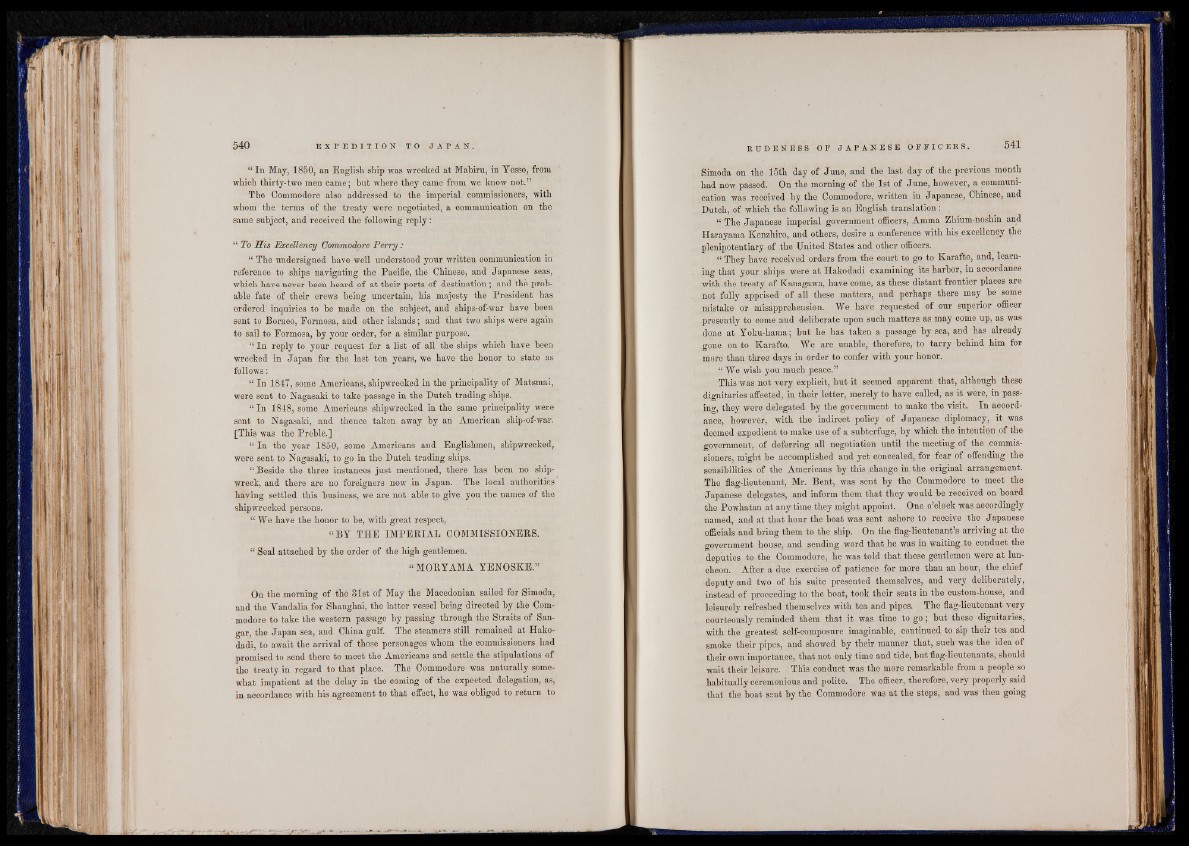
“ In May, 1850, an English ship was wrecked at Mabiru, in Yesso, from
which thirty-two men came; hut where they came from we know not.”
The Commodore also addressed to the imperial commissioners, with
whom the terms of the treaty were negotiated, a communication on the
same subject, and received the following reply:
“ To His Excellency Commodore Perry:
“ The undersigned have well understood your written communication in
reference to ships navigating the Pacific, the Chinese, and Japanese seas,
which have never been heard of at their ports of destination; and the probable
fate of their crews being uncertain, his majesty the President has
ordered inquiries to be made on the subject, and ships-of-war have been
sent to Borneo, Formosa, and other islands; and that two ships were again
to sail to Formosa, by your order, for a similar purpose.
“ In reply to your request for a list of all the ships which have been
wrecked in Japan for the last ten years, we have the honor to state as
follows:
“ In 1847, some Americans, shipwrecked in the principality of Matsmai,
were sent to Nagasaki to take passage in the Dutch trading ships.
“ In 1848, some Americans shipwrecked in the same principality were
sent to Nagasaki, and thence taken -away by an American ship-of-war.
[This was the Preble.]
“ In the year 1850, some Americans and Englishmen, shipwrecked,
were sent to Nagasaki, to go in the Dutch trading ships.
“ Beside the three instances just mentioned, there has been no shipwreck,
and there are no foreigners now in Japan. The local authorities
having settled this business, we are not able to give you the names of the
shipwrecked persons.
“ We have the honor to be, with great respect,
“ BY THE IMPERIAL COMMISSIONERS.
“ Seal attached by the order of the high gentlemen.
“ MOEYAMA YENOSKE.” ‘
On the morning of the 31st of May the Macedonian sailed for Simoda,
and the Vandalia for Shanghai, the latter vessel being directed by the Com-
' modore to take the western passage by passing through the Straits of San-
gar, the Japan sea, and China gulf. The steamers still remained at Hako-
dadi, to await the arrival of those personages whom the commissioners had
promised to send there to meet the Americans and settle the stipulations of
the treaty in regard to that place.; The Commodore was naturally somewhat
impatient at the delay in the coming of the expected delegation, as,
in accordance with his agreement to that effect, he was obliged to return to
Simoda on the 15£h day of June, and the last day of the previous month
had now passed. On the morning of the 1st of June, however, a communication
was received by the Commodore, written in Japanese, Chinese, and
Dutch, of which the following is an English translation :
11 The Japanese imperial government officers, Amma Zhium-noshin and
Harayama Kenzhiro, and others, desire a conference with his excellency the
plenipotentiary of the United States and other officers.
£i They have received orders from the court to go to Karafto, and, learning
that your ships were at Hakodadi examining its harbor, in accordance
with the treaty of Kanagawa, have come, as these distant frontier places are
not fully apprised of all these matters, and perhaps there may be some
mistake or misapprehension. We have requested of our superior officer
presently to come and deliberate upon such matters as may come up, as was
done at Y oku-hama; but he has taken a passage by sea, and has already
gone on to Karafto. We are unable, therefore, to tarry behind him for
more than three days in order to confer with your honor.
11 We wish you much peace.”
This was not very explicit, but it seemed apparent that, although these
dignitaries affected, in their letter, merely to have called, as it were, in passing,
they were delegated by the government to make the visit. In accordance,
however, with the indirect policy of Japanese diplomacy, it was
deemed expedient to make use of a subterfuge, by which the intention of the
government, of deferring all negotiation until the meeting of the commissioners,
might be accomplished and yet concealed, for fear of offending the
sensibilities of the Americans by this change in the original arrangement.
The flag-lieutenant, Mr. Bent, was sent by the Commodore to meet the
Japanese delegates, and inform them that they would be received on board
the Powhatan at any time they might appoint. One o’clock was accordingly
named, and at that hour the boat was sent ashore to receive the Japanese
officials and bring them to the ship. On the flag-lieutenant’s arriving at the
government house, and sending word that he was in waiting.to conduct the
deputies to the Commodore, he was told that these gentlemen were at luncheon.
After a due exercise of patience for more than an hour, the chief
deputy and two of his suite presented themselves, and very deliberately,
instead of proceeding to the boat, took their seats in the custom-house, and
leisurely refreshed themselves with tea and pipes. The flag-lieutenant very
courteously reminded them , that it was time to go; but these dignitaries,
with the greatest self-composure imaginable, continued to sip their tea and
smoke their pipes, and showed by their manner that, such was the idea of
their own importance, that not only time and tide, but flag-lieutenants, should
wait their leisure. This conduct was the more remarkable from a people so
habitually ceremonious and polite. The officer, therefore, very properly said
that the boat sent by the Commodore was at the steps, and was then going